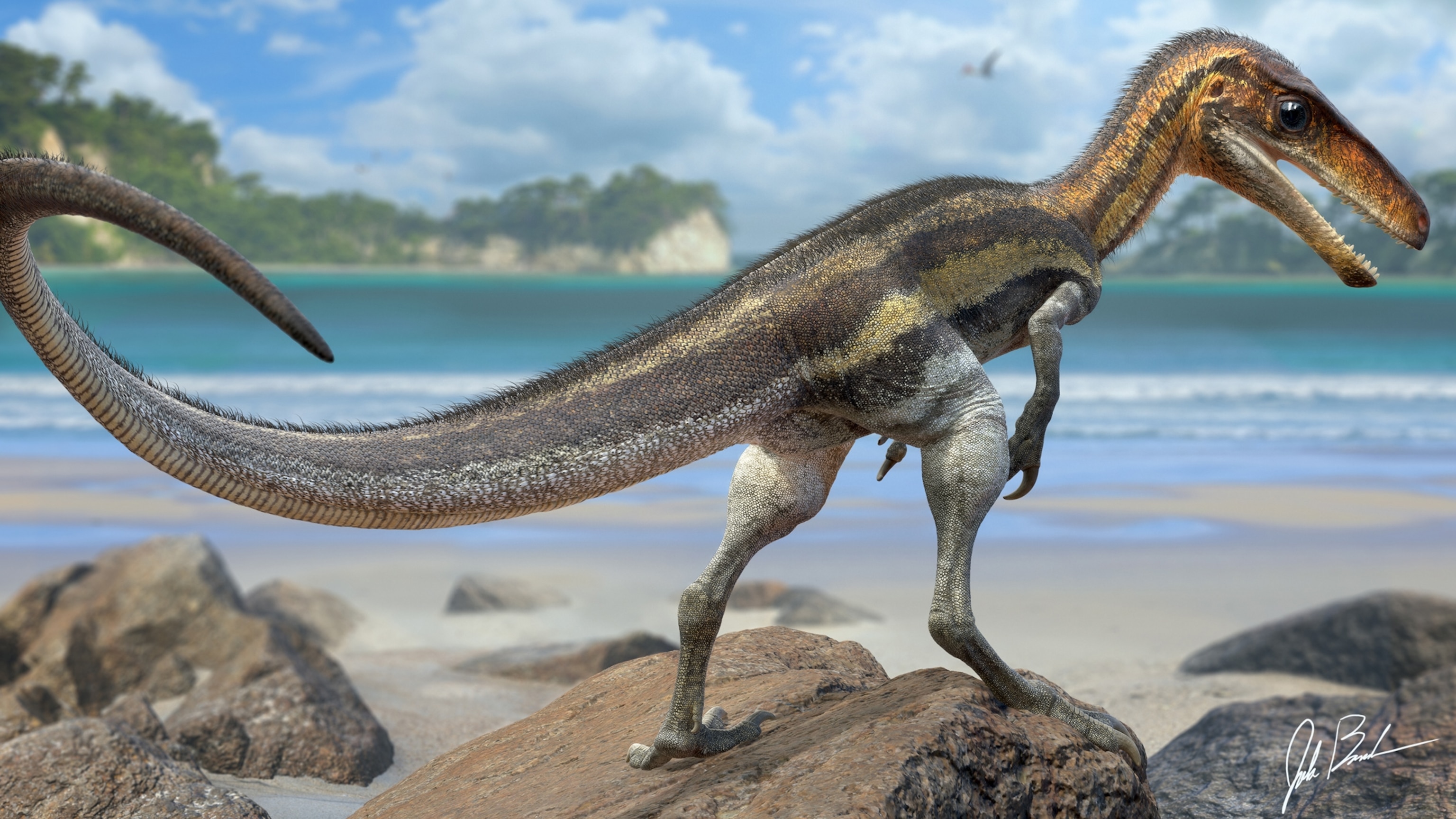A chicken-size dinosaur that lived in what is now Germany about 150 million years ago might have used sensory scales on its tail as it foraged for fish at night. These sensory organs, remarkably similar to those found on a crocodile, likely helped the animal suss out its environment as it waded across the shallow lagoons of a prehistoric archipelago that once covered Europe.
The only known fossil of the species Juravenator starki includes a largely complete skeleton and some preserved soft tissues—with skin around the tail revealing a unique pattern on the scales, as reported today in Current Biology.
“Skin only rarely preserves in the fossil record, so when we try to imagine living dinosaurs from just bones, details about their external body coverings are often speculative,” says Stephanie Drumheller-Horton of the University of Tennessee, Knoxville, who was not involved with the new research. “Soft tissues can really flesh out our interpretations of these groups.”

Circular knobs on the fossilized scales look similar to integumentary sense organs (ISOs), which cover the bodies of modern crocodiles. Crocs use these ISOs to detect the movements of prey around them as well as to gauge the temperature and acidity of the water.
Researchers have long assumed that dinosaurs did little more with their scales than use them as protective coverings, “but the reality is that scales are highly adapted organs that fulfill multiple functions and roles,” says study author Phil Bell, a paleontologist at the University of New England in Armidale, Australia. “To see these things first-hand, and how Juravenator might have interacted with its environment based on its sensory capacity, is thrilling.”
Dino senses
When Bell and co-author Christophe Hendrickx of the Unidad Ejecutora Lillo in San Miguel de Tucumán, Argentina, first examined the strip of concentric rings on the lower side of the tail, they suspected the unusual pattern was an effect of fossil preservation.
Yet “they were very regular—all the same size and limited to the band under the tail—so there was no mistaking these were real features, and they had a very peculiar anatomy to them,” Bell explains. Further examination with microscopes and UV light revealed they were similar in structure to the ISOs on crocodiles.
A croc’s ISOs “are quite unique, in that they are this sort of central dome surrounded by an almost moat-like ring,” Bell says. “They are commonly called touch spots or pressure sensitive organs, and their construction is apparently identical to what we saw in Juravenator.”
Paul Barrett, a paleontologist at the Natural History Museum in London who was not involved in the new study, says that while it’s possible the scales were solely ornamental, “the authors make a strong case” they had a sensory function, noting that the similarity to modern crocodile scales “is striking.”
If the Juravenator scales include ISOs, they’ll be the first sensory organs of any kind found in the skin of a dinosaur, Bell says.
“Like all other animals, dinosaurs would have needed to gather information on their environment in order to forage and move around efficiently,” Barrett says. “A tactile sense, in addition to the more obvious senses of sight, smell, and hearing, would give them another way to get this information.”
“The morphology of the scales is something I don’t think we’ve seen before in dinosaurs, and is a pretty close match” to modern crocodiles, says Caleb Brown, curator of dinosaur systematics and evolution at the Royal Tyrrell Museum in Drumheller, Canada, who also was not involved in the new study.
Brown suggests that experts look back at other dinosaur specimens with well-preserved skin in fossil collections to see if they might have similar sensory scales that were previously missed.
Prowling the waters at night
As with crocodiles, the scales may have had a hunting function, Bell and Hendrickx say, allowing Juravenator to detect the movement of prey around it as it waded through the water searching for fish.
The specimen has relatively large eyes, which may indicate the dinosaur was nocturnal. And although the fossil had no preserved gut contents, other related dinosaurs have been found with fossilized fish in their bellies.
“Juravenator may have been strictly nocturnal, rendering sensory capabilities that can counteract low light conditions even more essential,” the authors write in the new paper. This kind of hunting strategy makes sense for the plentiful shallow lagoons and coastal waters of Jurassic-era Europe, they argue.
Recent research inferred the presence of similar sense organs on the face of a relative of Tyrannosaurus, Drumheller-Horton says. But “these studies worked from the inside out, looking at the canals for blood vessels and nerves preserved inside the bones of the skull.”
Until now, finding evidence of external sense organs in other parts of dinosaurs’ bodies has proven difficult. We rarely get glimpses into the biology of dinosaurs, and when we do, that insight comes mostly from their bones, or, more recently, their feathers.
“People are enamored by the idea that all dinosaurs had feathers, but that’s only partly true,” Bell says. “Only one particular branch of the theropod tree appears to have had widespread feathers, whereas the majority of dinosaurs had scales.”
Future specimens with fossilized skin could provide additional glimpses of how these prehistoric animals lived. “There is only so much we can learn about the biology and behavior of extinct animals from their skeletons,” Brown says. “When exceptional preservation reveals details of skin, we get a sneak peek at a completely different world.”
